13 little-known punctuation marks we should be using
Sometimes, says Adrienne Crezo at Mental Floss, regular periods, commas, and apostrophes won't do
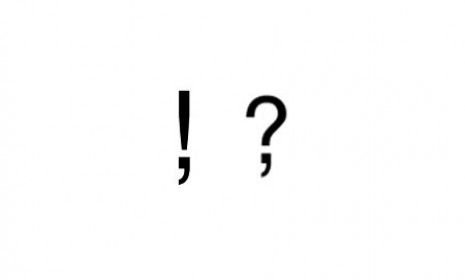
A free daily email with the biggest news stories of the day – and the best features from TheWeek.com
You are now subscribed
Your newsletter sign-up was successful

1. Interrobang

You probably already know the interrobang, thanks to its excellent moniker and increasing popularity. Though the combination exclamation point and question mark can be replaced by using one of each (You did what!? or You don’t read mental_floss?!), it’s fun to see the single glyph getting a little more love lately.
2. Percontation Point or Rhetorical Question Mark
The Week
Escape your echo chamber. Get the facts behind the news, plus analysis from multiple perspectives.

Sign up for The Week's Free Newsletters
From our morning news briefing to a weekly Good News Newsletter, get the best of The Week delivered directly to your inbox.
From our morning news briefing to a weekly Good News Newsletter, get the best of The Week delivered directly to your inbox.

The backward question mark was proposed by Henry Denham in 1580 as an end to a rhetorical question, and was used until the early 1600s.
3. Irony Mark

It looks a lot like the percontation point, but the irony mark’s location is a bit different, as it is smaller, elevated, and precedes a statement to indicate its intent before it is read. Alcanter de Brahm introduced the idea in the 19th century, and in 1966 French author Hervé Bazin proposed a similar glyph in his book, Plumons l’Oiseau, along with 5 other innovative marks.
4. Love Point
A free daily email with the biggest news stories of the day – and the best features from TheWeek.com
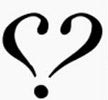
Among Bazin’s proposed new punctuation was the love point, made of two question marks, one mirrored, that share a point. The intended use, of course, was to denote a statement of affection or love, as in “Happy anniversary [love point]” or “I have warm fuzzies [love point]” If it were easier to type, I think this one might really take off.
5. Acclamation Point

Bazin described this mark as “the stylistic representation of those two little flags that float above the tour bus when a president comes to town.” Acclamation is a “demonstration of goodwill or welcome,” so you could use it to say “I’m so happy to see you [acclamationpoint]” or “Viva Las Vegas [acclamationpoint]”
6. Certitude Point

Need to say something with unwavering conviction? End your declaration with the certitude point, another of Bazin’s designs.
7. Doubt Point

This is the opposite of the certitude point, and thus is used to end a sentence with a note of skepticism.
8. Authority Point

Bazin’s authority point “shades your sentence” with a note of expertise, “like a parasol over a sultan.” (Well, I was there and that’s what happened.) Likewise, it’s also used to indicate an order or advice that should be taken seriously, as it comes from a voice of authority.
9. SarcMark

The SarcMark (short for “sarcasm mark”) was invented, copyrighted and trademarked by Paul Sak, and while it hasn’t seen widespread use, Sak markets it as “The official, easy-to-use punctuation mark to emphasize a sarcastic phrase, sentence or message.” Because half the fun of sarcasm is pointing it out [SarcMark].
10. Snark Mark
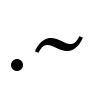
This, like the copyrighted SarcMark, is used to indicate that a sentence should be understood beyond the literal meaning. Unlike the SarcMark, this one is copyright free and easy to type: it’s just a period followed by a tilde.
11. Asterism
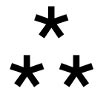
This cool-looking but little-used piece of punctuation used to be the divider between subchapters in books or to indicate minor breaks in a long text. It’s almost obsolete, since books typically now use three asterisks in a row to break within chapters (***) or simply skip an extra line. It seems a shame to waste such a great little mark, though. Maybe we should bring this one back.
12 & 13. Exclamation Comma & Question Comma
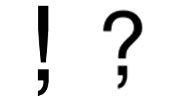
Now you can be excited or inquisitive without having to end a sentence! A Canadian patent was filed for these in 1992, but it lapsed in 1995, so use them freely, but not too often.
Big thanks to Scarlett and LeAnn for helping translate Bazin’s notes!
More from Mental Floss...
-
 The ‘ravenous’ demand for Cornish minerals
The ‘ravenous’ demand for Cornish mineralsUnder the Radar Growing need for critical minerals to power tech has intensified ‘appetite’ for lithium, which could be a ‘huge boon’ for local economy
-
 Why are election experts taking Trump’s midterm threats seriously?
Why are election experts taking Trump’s midterm threats seriously?IN THE SPOTLIGHT As the president muses about polling place deployments and a centralized electoral system aimed at one-party control, lawmakers are taking this administration at its word
-
 ‘Restaurateurs have become millionaires’
‘Restaurateurs have become millionaires’Instant Opinion Opinion, comment and editorials of the day